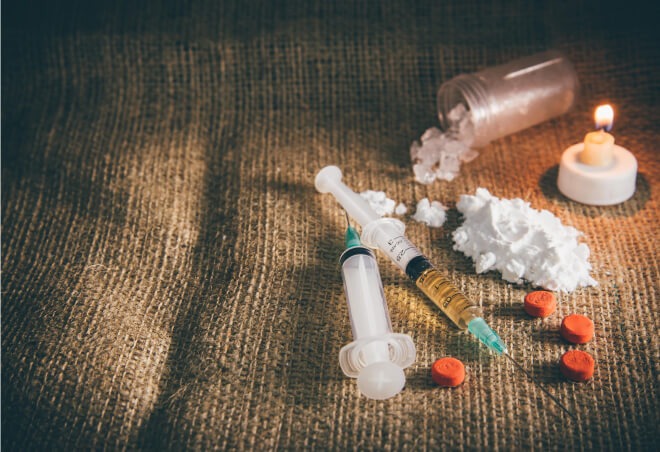Heroin is one of the most addictive and dangerous drugs around. Heroin typically looks like a white or brown powder or a black, sticky substance. It is a common street drug and also an opioid, which is one reason why it’s so addictive.
Key Points
- Heroin is a Schedule I controlled substance, the highest possible designation for a scheduled substance.
- Despite recent decreases, heroin overdoses still significantly harm the lungs, brain, and other organs; treatment involves detoxification, various therapies, and ongoing support.
- Heroin use targets brain pleasure and leads to dependence; addictive pain relief prompts cravings and crashes.
- Heroin is often injected, snorted, or smoked for a quick high.
What Is Heroin?
Heroin is made from morphine, a natural substance extracted from the seed pod of the opium poppy plant. Unlike other opioids like morphine or oxycodone, heroin has no medical use and is a Schedule I drug. Many who use heroin first abused prescription opioids.[1] Common street names for heroin include slap, junk, and dope. It is often used by young people for recreational purposes.
Side Effects of Heroin
In addition to an initial “rush” of euphoria and an absence of pain, other effects of heroin include warm flushes, dry mouth, itchiness, nausea, brain fog, and drowsiness.[2] Even with the first dose, heroin overdose is possible due to its potency and the unpredictability of its purity.[3] Experienced users are also at risk of overdose as they develop a tolerance and require larger doses for the same euphoric effects.
How is Heroin Taken?
Heroin is often injected after it’s melted, usually with a lighter and spoon or foil. Some people also snort or smoke the substance. All of these methods produce an immediate euphoric high.
Heroin Quick Reference

Drug Category
Opioid
Commercial & Street Names
Dope, junk, slap, atom bomb
DEA Schedule
Schedule I
Administration
Smoking, injection, snorting
Statistics on Heroin Use, Misuse, and Addiction
In 2022, 7% of overdose deaths were caused by heroin.[4] Those who abuse prescription opioids often move to heroin because it is stronger. However, it is also much more dangerous because it is unregulated and often mixed with harmful filler ingredients.
Effects of Heroin Abuse
Heroin targets the brain’s pleasure centers and stimulates the release of feel-good hormones like dopamine and serotonin. This makes it difficult for the brain to produce its natural pleasure chemicals, causing an unnatural reliance on the drug.
Heroin’s painkilling and euphoric effects are highly addictive and cause strong cravings. But this euphoria is followed by an unpleasant crash that spurs users to take higher doses or use heroin more frequently.
Can You Overdose on Heroin?
Yes. Though heroin overdose rates are declining overall, the illicit substance still claimed nearly 10,000 deaths in 2021.[5] A heroin overdose can cause your heart to stop or to stop breathing completely. It can also cause brain and organ damage, especially with long-term use.
Signs and Symptoms of Heroin Overdose
Most people who overdose on heroin will fall unconscious, and it may be impossible to wake them. Respiratory depression is a common symptom that may turn into hypoxia (lack of oxygen). This can cause brain damage and death.
What to do if you suspect someone is overdosing on Heroin
Call 911 and wait for the paramedics to arrive. If the person stops breathing or does not have a pulse, begin performing CPR. If you have Naloxone available, administer that as well and continue lifesaving efforts until help arrives.
Dangers of Long-Term Heroin Use
Long-term heroin use can cause permanent brain deterioration.[6] This diminishes a person’s decision-making abilities, memory, and behavior regulation. These consequences may persist long after a person has stopped abusing heroin.
Heroin Addiction and Abuse
A heroin use disorder is characterized by cravings, withdrawal symptoms, and a significant impairment in functioning. Someone with a heroin use disorder may let the drug control their life and revolve their daily actions around it.
Signs of Addiction to Heroin
Those addicted to heroin may steal money from their loved ones to buy more of the drug off the street. Some may spend a lot of time alone or be secretive. Others may be irritable or display erratic behaviors.
Heroin Addiction and Mental Health
While heroin’s euphoria causes intense happiness, its crash causes severe depression, anxiety, and suicidal thoughts. As heroin affects the brain, it gives rise to emotional and behavioral dysregulation. Certain co-occurring disorders often coincide with heroin use, including the following:
- Anxiety
- Depression
- BPD
- Impulse control disorder
- Drug-induced psychosis
Heroin Addiction Treatment
Each treatment plan is tailored to the individual, but most people take several months to recover. The cost of treatment will also differ depending on your program and insurance. Treatment programs emphasize therapy, support, and developing a more productive mindset.
Heroin Addiction Treatment Levels of Care
Choosing the right level of care is essential for your recovery. Certain programs are designed to treat certain severities of addiction. Consider the following:
- Medical detox: This is essential for safely removing heroin from your body so you can begin to heal your brain, body, and life.
- Inpatient treatment: This program lets you focus solely on treatment and receive therapy and support in a safe, supportive environment.
Therapies Used in Heroin Addiction Treatment
Certain therapies may work better for some than others, depending on your current mindset. Here are some evidence-based therapies used for treating drug addictions:
- Motivational Interviewing: This therapy intervention helps patients cultivate and enhance their innate motivation to make healthy changes.
- CBT: Cognitive behavioral therapy helps people identify harmful thought patterns and develop more constructive thinking to alter behavior.
- DBT: Dialectical behavior therapy is best for those who experience strong emotions.
- Experiential Therapy: This therapy uses tools and activities to let patients express their emotions in a safe environment.
- Twelve-Step Facilitation: After formal treatment has ended, 12-step support is critical for maintaining coping skills and relapse prevention.
Co-Occurring Disorders
Certain mental disorders may contribute to the development of substance dependence and addiction. The reverse is also true, that some substances can exacerbate the symptoms of mental health conditions. Common examples of co-occurring mental health disorders include the following:
- Depression
- Substance use disorder
- Bipolar disorder
- Anxiety
Heroin Detox and Withdrawal Management
The process of detox and withdrawal symptoms is your body evacuating the drug from your system. Withdrawal symptoms can worsen during the first few days or a week but subside in the following weeks.
Detoxing in a medical treatment center ensures you are in a safe and supportive environment and can take advantage of medication-assisted treatment and additional comfort measures. Completing this recovery phase is not the end but a stepping stone to other aspects of treatment.
Frequently Asked Questions
Who Uses Heroin?
Heroin is often an escalation substance for those who suffer from painkiller addiction or Opioid Use Disorder (OUD), with studies indicating that up to 80% of people who use heroin first misused prescription opioids.[7] It is also a common drug of choice among young people and is especially prevalent among those from disadvantaged socioeconomic backgrounds, as it can be inexpensive to acquire.
Why Do People Use Heroin?
In many cases, heroin use stems from a previous addiction to pain pills. Once a tolerance builds up, the pills lose their effectiveness, and users pursue more potent substances that offer stronger euphoric responses.
What Are Heroin Withdrawal Symptoms?
When you suddenly stop using heroin, your body goes into withdrawal. Common heroin withdrawal symptoms include rapid heart rate, dilated pupils, nausea, insomnia, chills, fever, dizziness, confusion, and depression.
NIDA. 2022, December 16. Heroin DrugFacts. Retrieved from https://nida.nih.gov/publications/drugfacts/heroin on 2023, July 5
NIDA. 2022, December 16. Heroin DrugFacts. Retrieved from https://nida.nih.gov/publications/drugfacts/heroin on 2023, July 5
What is heroin? How is heroin abused? What does it look like? (n.d.-g). Retrieved from https://www.justice.gov/archive/ndic/pubs3/3843/3843p.pdf on July 5, 2023
Heroin. (2024, May 7). Overdose Prevention. Retrieved from https://www.cdc.gov/overdose-prevention/about/heroin.html on July 03, 2024
U.S. Department of Health and Human Services. (2023b, July 10). Drug overdose death rate. National Institutes of Health. Retrieved from https://nida.nih.gov/research-topics/trends-statistics/overdose-death-rates# on July 5, 2023
NIDA. 2021, April 13. What are the long-term effects of heroin use? Retrieved from https://nida.nih.gov/publications/research-reports/heroin/what-are-long-term-effects-heroin-use on July 5, 2023
Opioid addiction – statpearls – NCBI bookshelf. (n.d.).
Retrieved from https://www.ncbi.nlm.nih.gov/books/NBK448203/ on July 5, 2023
